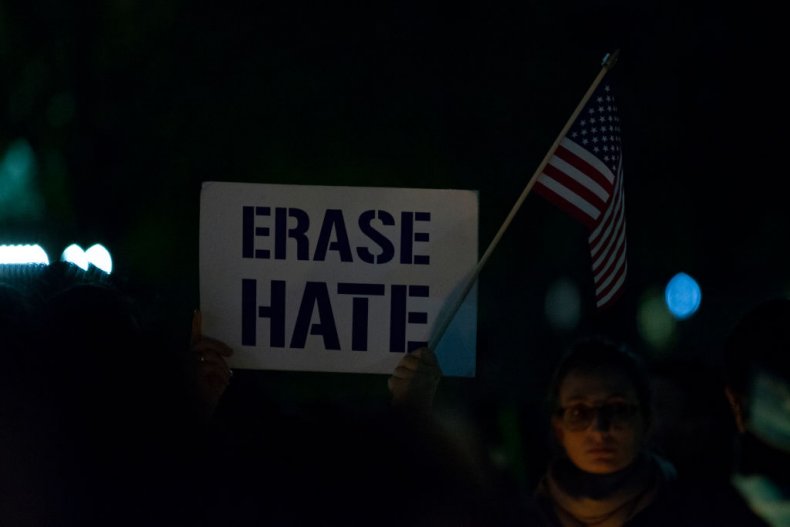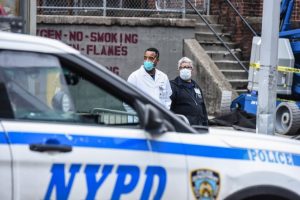A doctor claims he was shouted at and told to leave a gas station in what he believes was a racially motivated incident linked to the coronavirus pandemic.
The doctor was at a Marathon gas station in Martinsville, Indiana, when the clerk allegedly began shouting at him and asking him where he was from.
“Friday 27th, I believe, we received a call that a man of Asian descent had been refused service at a gas station, specifically due to his race being Chinese or Asian,” Martinsville Chief of Police Kurt Spivey told Newsweek. “My understanding is that this was directly in relation to the COVID-19 pandemic.”
David, who only wants to be known by his first name, explained to 1011 Now that the gas station clerk “persisted to ask where I’m from and [was] yelling at me. I explained that I was of Korean descent but born in Louisville, Kentucky”. David works with cancer patients—an at-risk group, vulnerable to the coronavirus.
“[The clerk] was very angry and told me to get out,” continued David. “I wasn’t allowed to buy anything there, not allowed to use the bathroom there. ‘Never come back. Don’t ever come back,’ [the clerk said] In a very violent and hateful way.”
The Martinsville Police Department followed up the incident by visiting the gas station.
“After speaking to the management and ownership of the store and gas station where this occurred they specified that this was a one-time incident,” said Chief Spivey. “They also stated that it was a language barrier issue. My understanding is that the subject was asked to leave by the clerk. The owner of the gas station has been nothing but apologetic and they are sorry that this entire incident happened and would like to move past it.
“I think it’s definitely a misunderstanding and one-time incident. On the other hand, we are not condoning that kind of behavior. That kind of behavior has no place in today’s society at all, if this incident occurred the way that one-side said it happened.”
This incident follows a series of what appear to be racially motivated discrimination cases sparked by the coronavirus pandemic. On Monday, the leaders of three separate congressional caucuses, the black, Asian and Hispanic groups, met to tackle the issue.
Chair of the Congressional Asian Pacific American Caucus, and California District Representative, Judy May Chu explained that more than 1,000 hate incidents have been reported since the beginning of the pandemic.
Topics raised at the conference included the circulation of unhelpful phrases like “Chinese virus” and “Wuhan virus,” which many believe incite racism towards minority groups.
World Health Organization advice for avoiding spread of coronavirus disease (COVID-19)Hygiene advice
- Clean hands frequently with soap and water, or alcohol-based hand rub.
- Wash hands after coughing or sneezing; when caring for the sick; before, during and after food preparation; before eating; after using the toilet; when hands are visibly dirty; and after handling animals or waste.
- Maintain at least 1 meter (3 feet) distance from anyone who is coughing or sneezing.
- Avoid touching your hands, nose and mouth. Do not spit in public.
- Cover your mouth and nose with a tissue or bent elbow when coughing or sneezing. Discard the tissue immediately and clean your hands.
Medical advice
- Avoid close contact with others if you have any symptoms.
- Stay at home if you feel unwell, even with mild symptoms such as headache and runny nose, to avoid potential spread of the disease to medical facilities and other people.
- If you develop serious symptoms (fever, cough, difficulty breathing) seek medical care early and contact local health authorities in advance.
- Note any recent contact with others and travel details to provide to authorities who can trace and prevent spread of the disease.
- Stay up to date on COVID-19 developments issued by health authorities and follow their guidance.
Mask and glove usage
- Healthy individuals only need to wear a mask if taking care of a sick person.
- Wear a mask if you are coughing or sneezing.
- Masks are effective when used in combination with frequent hand cleaning.
- Do not touch the mask while wearing it. Clean hands if you touch the mask.
- Learn how to properly put on, remove and dispose of masks. Clean hands after disposing of the mask.
- Do not reuse single-use masks.
- Regularly washing bare hands is more effective against catching COVID-19 than wearing rubber gloves.
- The COVID-19 virus can still be picked up on rubber gloves and transmitted by touching your face.



















